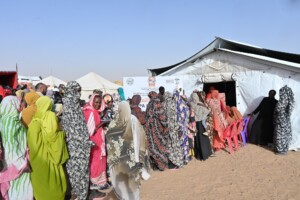Op-ed: What will be remembered? History and the Darfur genocide
Perhaps a full history of the ongoing genocide in Darfur will one day be written. To be at all useful, it will necessarily include events from 2002 (and earlier) through the (potential) transition to civilian governance in Sudan in 2019. There is still little evidence that the dynamic new Prime Minister of Sudan, Abdallah Hamdok, will be able to rein in the Rapid Support Forces (RSF) in Darfur or halt the predations of armed Arab groups targeting non-Arab/African farmers and internally displaced persons.
 A group of newly displaced people take shelter under a bush in Zamzam camp, North Darfur (Archive photo: Unamid)
A group of newly displaced people take shelter under a bush in Zamzam camp, North Darfur (Archive photo: Unamid)
Perhaps a full history of the ongoing genocide in Darfur will one day be written. To be at all useful, it will necessarily include events from 2002 (and earlier) through the (potential) transition to civilian governance in Sudan in 2019. There is still little evidence that the dynamic new Prime Minister of Sudan, Abdallah Hamdok, will be able to rein in the Rapid Support Forces (RSF) in Darfur or halt the predations of armed Arab groups targeting non-Arab/African farmers and internally displaced persons.
A role in the new Sovereign Council for RSF commander Hamdan Dagalo (“Hemeti”) seems to ensure that the RSF will remain the primary source of real power in Darfur; indeed, the Constitutional Draft ratified last month gives co-equal status to Hemeti’s RSF and the regular army, the Sudan Armed Forces (SAF), under the command of Sovereign Council head General Abdel Fattah al-Burhan. This in effect legitimates Hemeti’s forces as a private army, an untenable situation in any truly civilian government.
Beyond the continuing violence and insecurity in Darfur—which keeps more than 300,000 Darfuri refugees in eastern Chad, and leaves over two million displaced within Darfur—the truly vast resources necessary for reconstruction and restitution will have no adequate place in Sudan’s national budget, even if Prime Minister Hamdok reduces the exorbitant percentage of that budget devoted to the military and security services (including the RSF). Many thousands of farms and farmlands have been violently destroyed or seized by Arab militias and marauders; billions of dollars of livestock, crops, and possessions have been destroyed or seized; many thousands of villages have been wholly or partially destroyed, often including vital water sources and irrigation systems. Displaced farmers seeking to return to or work their farms are constantly subject to extreme violence, including murder, rape, and kidnapping.
In short, a violent catastrophe that has continued for seventeen years cannot be subject to a quick fix, and even preliminary improvements in the lives of people affected by the long siege of violence cannot begin until there is security. The “development” projects touted by the al-Bashir regime don’t begin to address the issues raised here, and IDP camps seem destined either to be dismantled or turned into giant, slum-like ghettoes if they lie near major towns (Nyala, el-Fasher, el-Geneina, two or three of the larger towns in Jebel Marra). Many of those who have violently seized farmlands come not from the Arab groups of Darfur but neighbouring Chad, as well as nearby Niger and Mali. It will take a military commitment nowhere in sight to remove them and allow for the safe returns of the farms’ true owners.
I have done what I can for more than twenty years to fight for a just peace in greater Sudan, including South Sudan, South Kordofan, Blue Nile, and indeed all the areas that have suffered under the brutal tyranny of the al-Bashir regime. I vowed to myself that I would not quit these efforts until I had outlasted al-Bashir—and so I have.
Since 2003 my efforts have concentrated on Darfur, as have my publications. For a period—roughly 2004 to the beginning of the Obama administration in early 2009—Darfur was an international human rights cause célèbre. There has perhaps never been a foreign affairs crisis not directly involving immediate U.S. national interest that has been so completely taken up by American civil society, and to a lesser degree the civil society efforts of Canada and Europe. During this period I found it relatively easy to publish my thoughts on Darfur in prominent venues, such as the New York Times, the Wall Street Journal, the Washington Post, Dissent Magazine, and many others.
But as the genocide continued with an apparent endlessness, those working in the cause of ending it wearied and drifted away. Perhaps more importantly, the priorities of the Obama administration were such that Darfur became much less important than a “productive” bilateral relationship between Washington and Khartoum in which counter-terrorism intelligence was the chief desideratum. One senior State Department official of the Obama administration spoke explicitly in November 2010 of “de-coupling” Darfur from any negotiations with Khartoum about securing international terrorism intelligence.
The second Obama administration Special Envoy for the Sudans, Princeton Lyman, declared with unsurpassable cynicism:
“We [the Obama administration] do not want to see the ouster of the [Khartoum] regime, nor regime change. We want to see the regime carrying out reform via constitutional democratic measures.” (Interview with Asharq al-Awsat, December 3, 2011)
This shameless dishonesty, suggesting that the regime of Omar al-Bashir could “carry out reform via constitutional democratic measures,” to this day shocks me: everyone in the Obama administration knew full well that this was a preposterous excuse for continuing business as usual with a man (and a regime) for which the International Criminal Court had issued an arrest warrant charging genocide, crimes against humanity, and war crimes in Darfur.
Today, I find it impossible to publish articles on Darfur in the prominent venues that once seemed to welcome my analyses; lecture invitations that were once more than I could possibly accept have ended entirely; broadcast interviews which I am sporadically invited to give have focused only on the events of the uprising, never on Darfur as a cause unto itself.
In a sense, this means little: early on in my writing about Darfur I resolved to create what I considered to be a year-by-year archive of the genocidal violence; the results of this archival endeavour may be found on my website, and in more organized form in the publications (including longer “e-publications) that are listed below.
This is my archive. It is difficult for me to imagine continuing this effort, although my Twitter account (@SudanReeves) is also an archive of more than 3,500 substantive Tweets since 2009, if with more discrete and focused commentary. I will continue to sustain this effort and give interviews as requested. But I no longer expect to publish in the more conventional sense. A decade of watching the world lose interest in the people of Darfur—mainly poor, Muslim, dark-skinned, and geopolitically irrelevant (and geographically extremely remote)—has been soul-destroying. Although I have received the most gratifying encouragement from my Sudanese friends and colleagues, as well as encouragement from many non-Sudanese friends and colleagues, I no longer believe I can contribute substantively, or at least in the ways I have in the past.
My hope, of course, is that someday someone will indeed write a full history of the Darfur genocide, and that the spate of books that appeared while Darfur was a subject of international interest will be superseded by the work of a person(s) committed to telling the full story, giving a full reckoning. Such a history cannot but be extremely harsh in its judgment.
If my work serves in any way in this cause, it will have been worth bearing witness as fully as I’ve been able to unfathomable human destruction and suffering.
For full archive, see www.sudanreeves.org
This article was originally published on sudanreeves.org
Disclaimer: The views and opinions expressed in this article are those of the contributing author or media and do not necessarily reflect the position of Radio Dabanga.
 Prof Eric Reeves is a Senior Fellow at Harvard University’s François-Xavier Bagnoud Center for Health and Human Rights. He has spent the past 20+ years working virtually full-time as a Sudan researcher and analyst, publishing extensively both in the US and internationally. He has testified several times before the US Congress, has lectured widely in academic settings, and has served as a consultant to a number of human rights and humanitarian organisations operating in Sudan. Working independently, he has written on all aspects of Sudan’s recent history. His book about Darfur (A Long Day’s Dying: Critical Moments in the Darfur Genocide) was published in May 2007. He has recently published Compromising with Evil: An archival history of greater Sudan, 2007 — 2012 (available at no cost as an eBook)
Prof Eric Reeves is a Senior Fellow at Harvard University’s François-Xavier Bagnoud Center for Health and Human Rights. He has spent the past 20+ years working virtually full-time as a Sudan researcher and analyst, publishing extensively both in the US and internationally. He has testified several times before the US Congress, has lectured widely in academic settings, and has served as a consultant to a number of human rights and humanitarian organisations operating in Sudan. Working independently, he has written on all aspects of Sudan’s recent history. His book about Darfur (A Long Day’s Dying: Critical Moments in the Darfur Genocide) was published in May 2007. He has recently published Compromising with Evil: An archival history of greater Sudan, 2007 — 2012 (available at no cost as an eBook)
Radio Dabanga’s editorial independence means that we can continue to provide factual updates about political developments to Sudanese and international actors, educate people about how to avoid outbreaks of infectious diseases, and provide a window to the world for those in all corners of Sudan. Support Radio Dabanga for as little as €2.50, the equivalent of a cup of coffee.












 and then
and then